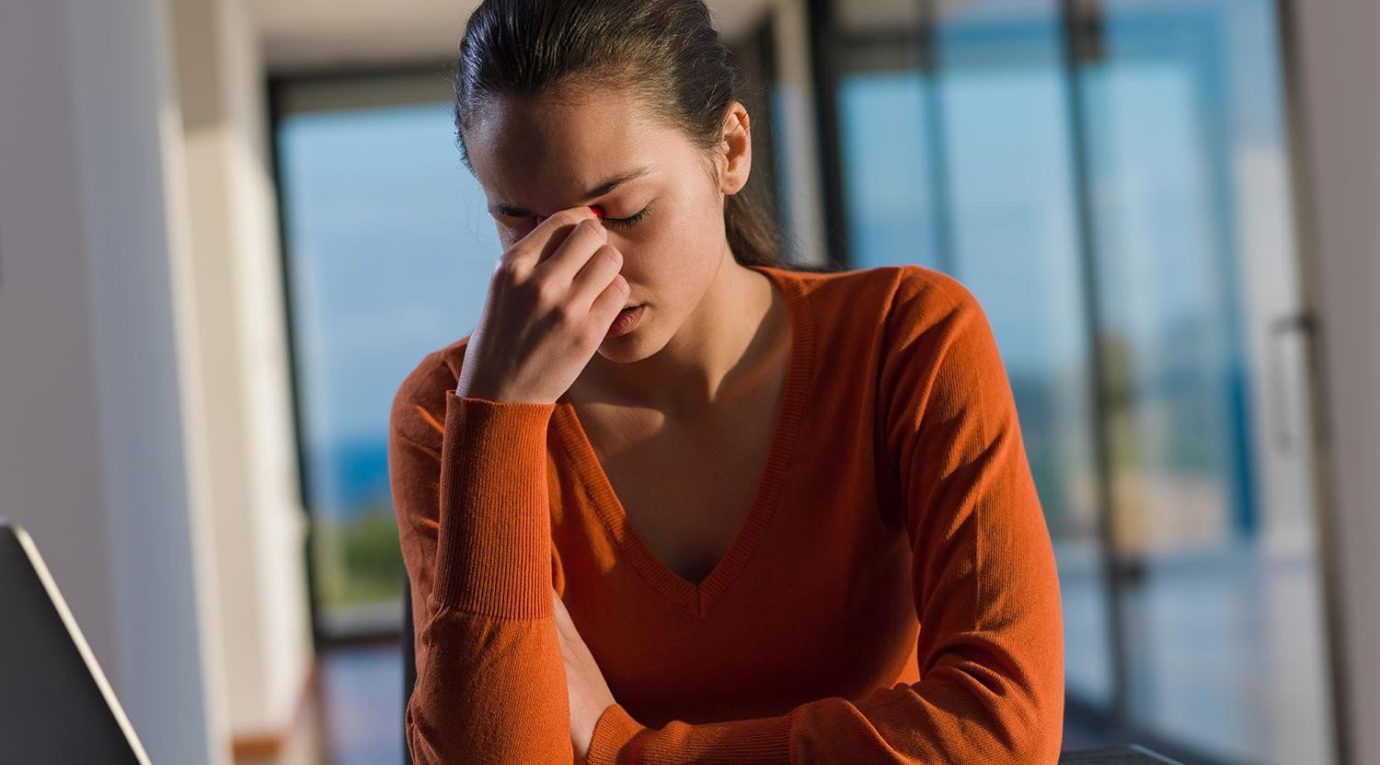Learn how to prevent eye strain, but first, what is eyestrain and is it impacting your life? Eyestrain, or eye fatigue, can be challenging to diagnose because many may describe the symptoms they are experiencing as “just feeling tired.” Does this sound familiar? Besides being tired, are your eyes sore or are they burning or itchy? Perhaps your eyes are watery, or you may have dry eyes. Maybe you have blurred or double vision, or you could be sensitive to light. If you have those symptoms that accompany your “tiredness,” you may be suffering from eyestrain.
Cassidy is a pharmacist. She’s in her mid-40s and enjoys her job working in the pharmacy of the hospital 20 minutes from her home. She spends her day interacting with patients and filling prescriptions the doctors in her hospital prescribe to the sick and infirm. Much of her job is spent staring at a computer screen and then looking at the labels of hundreds of bottles of medicine sitting on the shelves. Cassidy makes sure the names on the pills match the labels on the bottle before filling the prescription. Precision is necessary. Someone’s life could depend on the accuracy of her work.
When Cassidy arrives home, she discovers that her eighth-grade daughter needs help on her algebra, again. She spends an hour at the kitchen table looking from the textbook spread open in front of her daughter to the computer screen where a YouTuber explains how to do a similar problem.
By bedtime, Cassidy feels exhausted. She thinks with disappointment about how she never made it to the gym that day, but her neck and back feel kinked, and her head and eyes are aching. Cassidy knows that her tiredness has little to do with physical exertion. She hardly walked 5,500 steps that day. Instead, she attributes her lack of energy to mental exhaustion.
Yes, Cassidy did use her brain a lot in the course of her day, but what she may be feeling is not as likely caused by her mental activity. Eye strain or eye fatigue probably cause it.
Those suffering from eye fatigue may also complain of other aches and 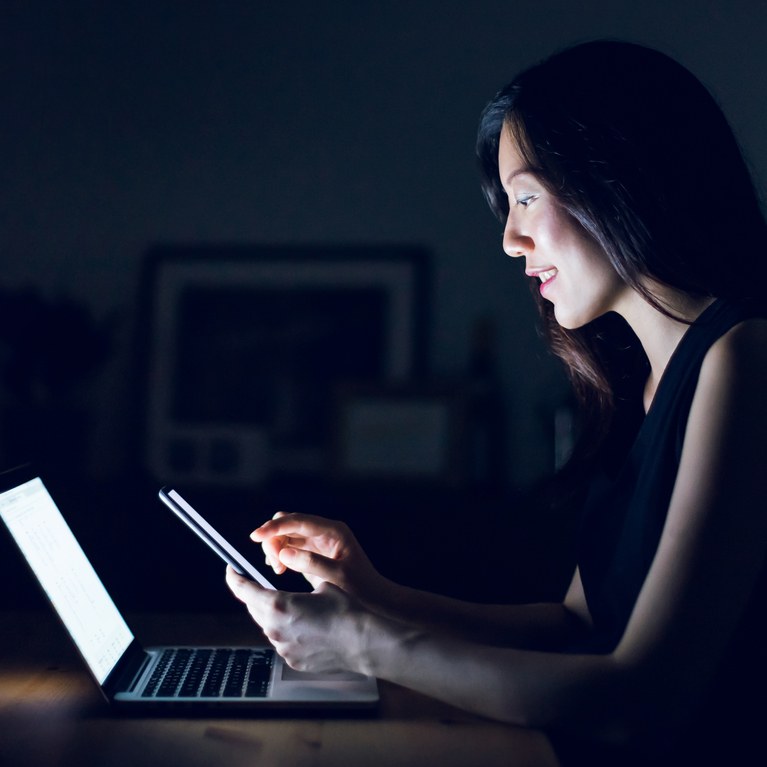

Related: Eye Strain Causes
Cassidy aced all her math classes in college, but helping her daughter with her eighth-grade work seems overwhelming by the end of the day. Eye fatigue can also affect how you think. Those who use their eyes all day may have a hard time focusing on an intricate task.
Eyestrain, or eye fatigue, affects the quality of Cassidy’s life. It may be changing your life as well. You have a limited number of years on this planet, so it’s important to do things for yourself to ensure a high quality of life. Exercise. Take time to eat well and enjoy your meals. Do yoga or stretching exercises daily, and take care of your eyes.
Before we can discuss how to prevent eyestrain, it is essential to understand what causes it in the first place.
How to Prevent Eye Strain: What’s the cause of your condition?
Knowing how to prevent eyestrain begins by understanding the cause of the condition. A medical condition can cause eyestrain. People with diabetes have more problems with their eyes than those who have regular blood sugar. High blood sugar causes the lens of your eye to swell. Those with swollen eyes will have a difficult time seeing. People with diabetes are more likely to develop cataracts, glaucoma, and retinopathy.
How’s your blood pressure? Blood pressure affects eye health as well. High blood pressure could lead to eye fatigue. Those who have Sjogren’s Syndrome, an autoimmune disease that affects your tears and saliva production, have a tough time keeping eyes appropriately moist. Dry eyes equal fatigued eyes.
One of the most significant medical causes for eyestrain is seasonal allergies. While standing in line at the pharmacy recently, I noticed that the three people in front of me were purchasing allergy medication. While some allergy medication alleviates the discomfort of your eyes, some people may have to turn to eye drops and cold compresses to give comfort to their burning eyes during allergy season.
Related: Digital Eye Strain
Finally, another medical reason that you may be suffering from eye fatigue is that you are wearing corrective lenses or glasses that are the incorrect prescription. Maybe you need glasses, but you refuse to go to the eye doctor. Squinting constantly to see causes eye fatigue. Even if you don’t want to wear glasses, it may be what is best for your eyes and your health. Picking out glasses can be fun! It’s like picking out a brand-new face. Not only will you be able to see, but perhaps your friends and co-workers will assume you are smarter than you really are. Figure out the name of your optometrist, and give the local office a call.
The previously listed causes of eyestrain are mostly medical, and can’t be eliminated without some medical treatment. There are other things you are doing or not doing that could be causing poor eye health. After explaining what these causes are, we will then look at how to alleviate those issues.
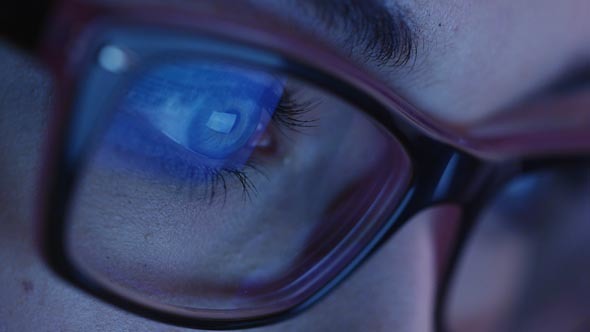

What Causes Eye Strain
Chances are, you are reading this article from a tablet, phone, or computer screen. Whatever your choice of device, you may be causing your eyes unnecessary strain. In fact, the medical community has noticed that many patients are being affected negatively from hours of computer use each day. They even made up a fancy new label to describe this syndrome. Someone really smart and great with words came up with the name for this problem. It is now called Computer Vision Syndrome. We know working on a computer all day is hard on our eyes, but that doesn’t mean we can or need to stop using them, even though I’m sure plenty of you would be okay with that. The reality is that print media can cause eyestrain as well so don’t be quick to blame technology on this problem.
Unless we all decide to quit our regular jobs and become goat herders in the mountains of Peru (are there mountains in Peru? For that matter, are there any goats on those mountains? Hmmm.) We will need to figure out how to be able to do our jobs and snoop on people through Facebook with technology without causing our eyes to itch and burn. More on this later.
It’s not only computer users who suffer from eyestrain. Those who drive for their jobs find that their career is hard on the eyes as well. Instead of a constant focus on a screen that is 24 inches in front of you, drivers are always staring at the road in front of them for hours at a time. Driving at night or during wet conditions also gives your eyeballs a beating.
Those who spend a lot of time outside also may have problems with eye fatigue. Working outside may cause you constantly to squint from the sun’s brightness unless you live in Seattle and don’t have to worry about the sun getting in your eyes.
Related: Eye Strain Headache
Another factor that could be irritating your eyes is air. If you live around a smoker or you are a smoker, you are more likely to suffer from eye fatigue than if you lived your life smoke-free.
Sitting near a vent or fan at work can cause eye irritation. Constant air blowing on or around your face can cause eye irritation as well.
Does it seem as if there are so many causes of eyestrain that it feels as if it is impossible to prevent it? We can’t sit around with our eyes closed all day, so what do we do?
There are several things we can do to treat our eyes well. Even if you don’t think you suffer from eyestrain issues, it is a good idea to follow these practices anyway. Think of it as an experiment with no adverse outcomes possible. Following these guidelines may make you feel more energized at the end of the day. You may get fewer headaches and feel less tension.
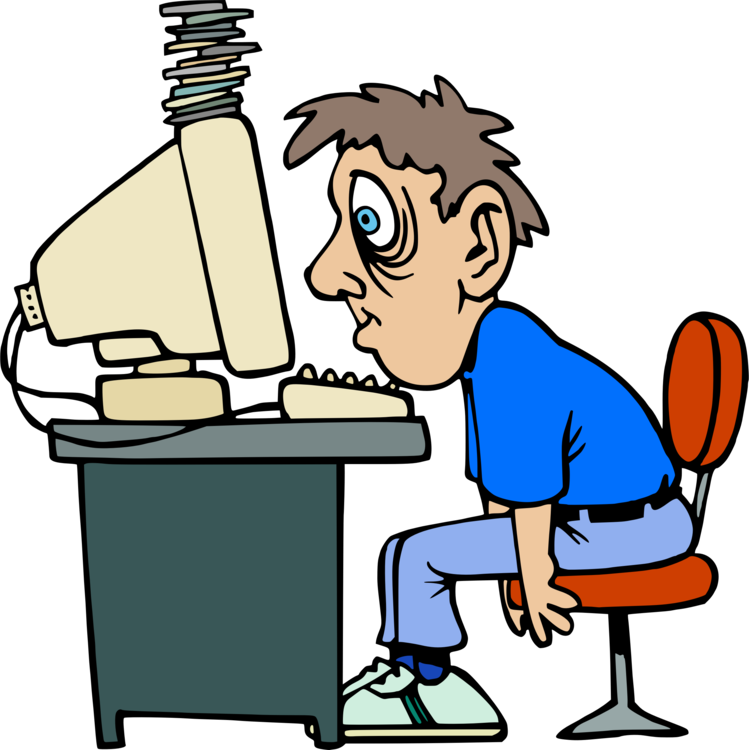

How to Prevent Eye Strain
Let’s first talk about avoiding eyestrain while using technology – phones, computers, and TV screens.
Pay attention to the placement of your screens
Your television screen should be eight to 10 feet from your lounging spot. Ideally, you should not have to look up to see the screen. For some reason that I can’t understand, looking up apparently causes more eyestrain than not. While watching TV, leave another light on in the room, and no, your phone screen does not count as another light. Having another light on keeps the eyes from having to adjust from darkness to brightness while watching TV continually. Having a light on also allows you to see who is stealing your popcorn or taking slurps from your squishy.
Speaking of lights, pay attention to the lighting in your room
Does natural or artificial lighting cause a glare on your screen? Tilt your screen or adjust your lighting so this does not happen. It may not seem bothersome to you at first, but over time watching a screen with a glare can cause eye fatigue.
Give your eyes a break
Using any muscle in your body continuously will wear it out and will cause fatigue. During commercial breaks, turn to your loved one sitting near you on the couch and stare lovingly into his or her eyes. Or look at your dog. Or at the pile of shoes and jackets that your kids left on the floor. You choose what to look at, but give your eyes a break for a few moments from looking at a screen.
The same rules apply from watching television to using a computer, right? Not necessarily. Yes, you still should have additional lighting in your room when using the computer. (Again, make sure that lighting does not cause a glare on your computer screen.) But if we sat eight to 10 feet from our computer, typing would be especially awkward and cumbersome. While working on a laptop, your eyes should be 20 to 28 inches from the screen. Pay attention to your posture too. Your knees should be lower or at the same level as your hips, and the chair should be slightly reclined. Think about this as you type. You may need to adjust and remind yourself of the best practices constantly.
Adjust the brightness of your screen to the desired level
Longer battery life may not compensate from feeling lousy at the end of the day from straining your eyes to see the screen regularly.
Pay attention to the size of your screen as well
For those fellow writers out there, adjust your font, so it is as large as possible on your computer screen as you type. If you are having a difficult time seeing your computer screen, your body will compensate in other ways without you even realizing it. Your brow will begin to furrow (hello, wrinkles!), you will hunch forward (hello, tired shoulders and an aching back), and your body will not be as relaxed as it could be. Eyestrain and eye fatigue do affect the entire body! Taking care of your eyes will make your whole body feel better.
Related: Eye Strain Symptoms
My apologies, but I need to get a little technical right now. Another reason for eye fatigue is the light that emanates from those screens we love to stare at every night. Screens blast out a blue light, which is necessary because this light allows users to adjust the brightness of their displays. This blue light has a wavelength that is harder on the eyes than other hues. Between 380 and 470 mn, the blue light can affect sleep patterns. Your body’s natural clock can be altered, and this can lead to depression. Some studies show that exposure to this blue light can cause cataracts. How do you know if the blue light is affecting your sleep?
We can’t say for sure, but if you have sleep issues, avoiding a screen a few hours before bed would be worth trying. Set a good example for your kids and enjoy another activity before going to sleep. Read a book. A real book printed on paper with ink. Try it for a week and see how you feel afterward.
Check your computer and television screen for a nighttime setting
This one is for those that can’t live without watching The Bachelor before bed. This setting alters the coloring of your computer to reduce the amount of blue emanating from your screen. You can set your Apple devices to change at certain times of the night automatically. Scroll through the options on your television and PC to see if there are similar settings that can be altered each night automatically.
Does the blue light coming from your screen affect your eyes during the day?
Yes, and while it may not change your sleep pattern hours before bed, it can cause eye fatigue. There are special glasses that are designed to wear while using a computer that helps block your eyes from the harmful blue hues. These glasses are usually amber in tint, and the yellowish color helps filter out the blue rays. There are a wide variety of options available from America’s favorite online retailer, and a few look pretty fashionable. There are also varieties available that not only block the blue light, but the glasses also offers magnification as well. If you are in your 40s and already wearing “readers,” why not spend the extra few bucks and purchase glasses that protect you from the blue hue as well? Visit your local drug store first to see which magnification works best for you while you are on the computer.
If you believe that your eye strain is caused from the computer monitor at work that is as old as the hills, consider purchasing a screen that fits over the monitor. Anti-glare screens are a cheaper alternative than purchasing a new monitor or computer. Whatever type of monitor you have, keep a lint-free cloth nearby to keep your screen free from fingerprints and blotches.
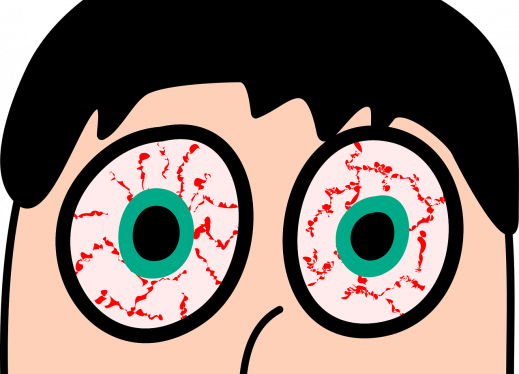

How do you protect your eyes from eyestrain while working outside?
- Purchase Quality Sunglasses
Not everyone suffering from eyestrain stares at a computer screen 10 hours a day. Some of you may work outside and put your eyes through a workout. Well, of course, one obvious choice is to wear sunglasses. Before researching this article, I would have told you that you needed to spend a substantial amount of money to purchase a quality pair of sunglasses – sunglasses that protect you from the sun’s harmful rays. This is not the case.
Related: Best Eye Strain Glasses
Look at the labels on the glasses before you purchase them. If they block 100 percent of UVA and UVB rays, you are on the right track. This certification also may be labeled at UV 400. Also, make sure you purchase glasses that are polarized. Polarized lenses cut down on the amount of glare. Make sure your prescription glasses and sunglasses have an anti-glare film over them to keep your eyes in tip-top shape and free of fatigue.
Keep in mind that sunlight can enter your eyes from the periphery. The larger the lens on your sunglasses, the more rays are blocked. Also, remember to wear a hat with a bill while working outdoors. Wear a hat, even if it looks goofy. Wear the hat even if your kids don’t want to be seen with you while you are wearing it.
Another benefit of wearing sunglasses that you may not have thought of before is that sunglasses help block pollen and dust from entering your eyes. Allergies are another common cause of eye fatigue. How do you avoid allergy eyes without living in a bubble? First off, it may be helpful to know what your eyes are reacting to that causes them to be red, itchy, tired, and irritated. Are you allergic to pet dander? Pollen? Mold? Dust? If you can avoid situations when you are in contact with those substances, then that would be your first line of defense.
- Consider Allergy Medications
If you are like my brother-in-law and allergic to pretty much everything except water, then allergy medication will not only give your nose relief, but it will also cut down on eye fatigue as well. Antihistamines help fight allergies that affect the eyes. “Anti” histamines fight histamines, a natural chemical that causes red, puffy eyes and irritation. Those suffering from allergies also could benefit from a prescription eye drop. My brother-in-law’s allergist told him to shower more often. The allergist wasn’t trying to be rude. Showering rids your body of those allergens that grab onto your clothes and skin while you are out and about. Also, cleaning your home more often could help too. Or hiring someone to clean your house will help you, your eyestrain, and your stress level. It’s a win-win!
- Blink Often
Another helpful practice that helps combat eyestrain doesn’t cost any money or take time out of your day. That’s not true, actually. It takes 300 to 400 milliseconds. To help avoid eyestrain, you need to remember to blink. Blinking refreshes your eyes and keeps them moistened. Of course, it is a good practice, but didn’t I learn in middle school science that blinking was an involuntary movement, and we don’t have to think about it? Apparently, when we stare at screens, we blink 66% less than if we are looking elsewhere. I’m thankful that I wasn’t the graduate student assigned to record the number of blinks of volunteers staring at a screen. Blinking is like posture. We all know we should sit up straight, but it is something you may not think about often. Try to remind yourself to blink more often and sit up straight.
- Avoid Stress
Finally, one of the most critical ways to eliminate eye fatigue is to avoid stress. Stressful situations cause your brow to furrow and your muscles to tense. Analyze yourself to think about which circumstances cause you the most anxiety or tension. Does talking with your boss make your eyes and body tense? What about driving through rush hour traffic? Perhaps it is the interaction with your teenager that causes the most tension in your life. Once you can analyze what is stressing you out, read and discover calming strategies to use when you are in the heat of the moment. I have a suggestion for a plan to handle the stress of interacting with your teenager. Repeat to yourself “this, too, shall pass” over and over again. And then drink a bottle of wine.
- Visit Your Optometrist Regularly
The last bit of advice I have for you on how to prevent eye strain is to visit your eye doctor regularly. It could be that your eyes are feeling fatigued because you are now wearing the appropriate prescription for your vision. You may not want to admit that you are having a difficult time seeing because you don’t want to wear glasses. Perhaps you feel that wearing glasses is a sign of aging, and you are not ready to admit that you aren’t as young as you used to be. I’m here to tell you to “get over yourself,” and buy the darn glasses. You won’t look like an old fogey just because you have glasses perched on your face. Just don’t buy the ones that hang around your neck by a chain. Those will make you look old.
Summary of practices for how to prevent eyestrain or eye fatigue:
- Blink often when using a computer or watching TV.
- Avoid the blue hues from screens either by wearing glasses or changing the settings on your devices.
- Wear sunglasses that actually protect your eyes.
- Avoid glares from your glasses or screens. Give Blue Blocker glasses a try
- Wear a hat
- Treat your allergies
- Reduce the stress and tension in your life with a cooling mask
- Take breaks by focusing on different distances periodically
- Use eye drops
- Stay hydrated
- Blink again
- Visit your eye doctor regularly
You Can Prevent Eye Strain!
Even if you don’t feel that you are suffering from eyestrain or eye fatigue, it would be an interesting experiment to follow some of these practices anyway. You may not realize how tired you are because you stare at your computer screen for two hours before bed each evening. Maybe this is affecting your sleep without you even realizing it. Perhaps you should purchase that new pair of sunglasses and see how wearing protective eyewear while enjoying the great outdoors makes you feel at the end of the day. Wear the big floppy-brimmed hat.
Make sure all your devices are set up an appropriate distance from the user. Drink more water (and reduce the amount of alcohol you consume.) Place a sign near your computer keyboard that reminds you to blink. You may feel fine right now, but perhaps after following these strategies, you will feel better than you ever have before.
Take care of your eyes. You were only given two of them.
